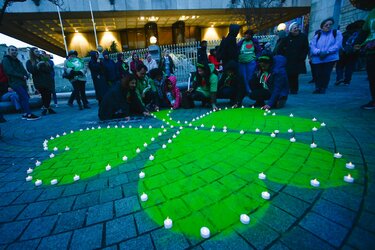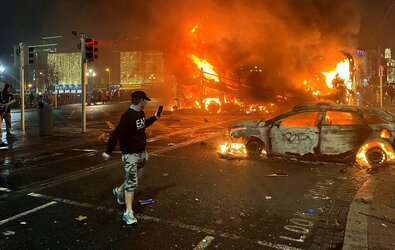From The Conversation, April 17, 2024
Archive, link to original

Undocumented migrants in Ireland hold a demonstration in 2017. Artur Widak/NurPhoto via Getty Images
Ireland’s new prime minister is a relatively young man leading a comparatively young republic that is experiencing several unprecedented challenges.
Simon Harris was confirmed as “taoiseach,” or prime minister, on April 9, 2024, following the surprise resignation of his predecessor, Leo Varadkar.
The 37-year-old Harris takes the helm of a country very much at the crossroads of change. Local, national and presidential elections are all on the horizon, with the outcomes potentially determining the form that Irish democracy – and quite possibly unity in an island partitioned between a British-ruled north and an Irish republic in the south – will take.
Underlying these decisions is the question of how Irish voters will respond to the challenge of what is being called the “New Ireland” – a country in which approximately 20% of the population was not born in the republic, with a similar number identifying as nonwhite Irish.
Moreover, change has taken place in a relatively short space of time and has had a significant impact on the republic’s current population of just above 5 million.
In 2023, 141,600 people immigrated to Ireland, representing a 15-year high. The majority are returning Irish nationals, many from the United Kingdom, encouraged by Ireland’s buoyant economy and ties to the European Union. But there are also a sizable number of Ukrainian refugees. A smaller number come from India, Brazil or Africa, the latter including refugees from the main conflict zones of Eritrea, Sudan, Somalia and the Democratic Republic of Congo.
The record levels of immigration, coming at a time of a severe housing shortage in Ireland, has led to a backlash that boiled over on Nov. 23, 2023. Triggered by the stabbing of three young children and their care assistant in the center of Dublin by an immigrant of Algerian origin, a mob unleashed looting, arson and vandalism on the streets of Dublin. The Garda (police) commissioner blamed the events on a “lunatic, hooligan faction driven by a far-right ideology.”

Anti-immigrant sentiment boiled over into rioting in Dublin on Nov. 23, 2023. Peter Murphy/AFP via Getty Images
Anti-immigrant sentiment has been accompanied by a hashtag campaign, #irelandisfull. And it isn’t only taking the form of street violence. The overtly anti-immigrant Ireland First was officially registered as a political party in 2023 and is seeking candidates for the upcoming elections.
To counter growing tensions, Harris has said he intends to pursue a “more planned and sustainable” immigration policy.
But familiarity with Ireland’s history may offer a counterpoint to the Ireland-is-full viewpoint, which has little to do with traditional Irish values regarding hospitality. Rather, such views run counter to Brehon law – the customs and laws that governed Irish society before the coming of the English in the 12th century.
The Brehon laws were a remarkable body of progressive codes that regulated all aspects of society, from beekeeping to homicide. Their exact origins are unknown, but for several centuries they were passed on orally from one generation to the next.
In the seventh century, the laws were written down for the first time, usually by Christian monks – the preservers of much ancient Celtic culture.
On the topic of hospitality, the Brehon laws were unequivocal: All households, from royal residences to the poorest of homes, were obliged to provide some measure of “oigidecht” – or hospitality – to travelers, even if they were unknown. In old Irish, the word oigi meant “stranger.”
The hospitality included food and drink, and even entertainment, although the level of each depended on the social status of the household. No monetary payment was expected, although the visitor could offer a poem or a song to his hosts.
Refusal to abide by these rules could result in ostracization or a fine.
The arrival of the English, and with them English common law, eroded the use of the Brehon laws, although they did not completely disappear until the 17th century.
Today, the name survives in U.S. cities through the existence of Brehon law societies, which place human rights at the heart of legal interventions.
It is a well-earned reputation. From the time of the French Huguenots fleeing religious persecution in the 17th century to the Ukrainian refugees in the 2020s, Ireland has offered shelter to those facing discrimination and death elsewhere.
And it has long given a warm welcome to nonwhite visitors, from African-born Olaudah Equiano in the 1790s to American abolitionist Frederick Douglass in the 1840s to U.S. actor and activist Paul Robeson in the 1930s – each of whom regarded their time in Ireland as some of their happiest.

A statue of antislavery campaigner Frederick Douglass is unveiled in Belfast, Northern Ireland. Liam McBurney/PA Images via Getty Images
Douglass, then a fugitive slave, was struck by “the total absence of all manifestations of prejudice against me, on account of my color.”
It is a reputation that has paid dividends, too. Irish tourism remains robust, generating over 5.3 billion euros in revenue (approximately US$5.7 billion) in 2023, making it the country’s major native industry and the largest regional employer.
An integral part of the promotion of Ireland as a tourist destination is the concept of visiting “Ireland of the Welcomes,” where the time-honored greeting is “Céad Míle Fáilte,” which translates as “a hundred thousand welcomes.”
As Ireland – and its new, young leader – responds to the challenges of becoming a more diverse society, the Brehon laws may serve as a guide for Irish seeking a return to traditional values grounded in hospitality and inclusivity, delivering a new Ireland in which both tourists and immigrants are given “a hundred thousand welcomes.”
Archive, link to original

Undocumented migrants in Ireland hold a demonstration in 2017. Artur Widak/NurPhoto via Getty Images
Ireland’s new prime minister is a relatively young man leading a comparatively young republic that is experiencing several unprecedented challenges.
Simon Harris was confirmed as “taoiseach,” or prime minister, on April 9, 2024, following the surprise resignation of his predecessor, Leo Varadkar.
The 37-year-old Harris takes the helm of a country very much at the crossroads of change. Local, national and presidential elections are all on the horizon, with the outcomes potentially determining the form that Irish democracy – and quite possibly unity in an island partitioned between a British-ruled north and an Irish republic in the south – will take.
Underlying these decisions is the question of how Irish voters will respond to the challenge of what is being called the “New Ireland” – a country in which approximately 20% of the population was not born in the republic, with a similar number identifying as nonwhite Irish.
A history of immigration
For a country whose main export, historically, has been its people – with 8 million leaving between 1815 and 1914 in large part because of a famine – and one that experienced little inward immigration until recently, this marks a substantial shift.Moreover, change has taken place in a relatively short space of time and has had a significant impact on the republic’s current population of just above 5 million.
In 2023, 141,600 people immigrated to Ireland, representing a 15-year high. The majority are returning Irish nationals, many from the United Kingdom, encouraged by Ireland’s buoyant economy and ties to the European Union. But there are also a sizable number of Ukrainian refugees. A smaller number come from India, Brazil or Africa, the latter including refugees from the main conflict zones of Eritrea, Sudan, Somalia and the Democratic Republic of Congo.
The record levels of immigration, coming at a time of a severe housing shortage in Ireland, has led to a backlash that boiled over on Nov. 23, 2023. Triggered by the stabbing of three young children and their care assistant in the center of Dublin by an immigrant of Algerian origin, a mob unleashed looting, arson and vandalism on the streets of Dublin. The Garda (police) commissioner blamed the events on a “lunatic, hooligan faction driven by a far-right ideology.”

Anti-immigrant sentiment boiled over into rioting in Dublin on Nov. 23, 2023. Peter Murphy/AFP via Getty Images
Anti-immigrant sentiment has been accompanied by a hashtag campaign, #irelandisfull. And it isn’t only taking the form of street violence. The overtly anti-immigrant Ireland First was officially registered as a political party in 2023 and is seeking candidates for the upcoming elections.
To counter growing tensions, Harris has said he intends to pursue a “more planned and sustainable” immigration policy.
But familiarity with Ireland’s history may offer a counterpoint to the Ireland-is-full viewpoint, which has little to do with traditional Irish values regarding hospitality. Rather, such views run counter to Brehon law – the customs and laws that governed Irish society before the coming of the English in the 12th century.
The Brehon laws were a remarkable body of progressive codes that regulated all aspects of society, from beekeeping to homicide. Their exact origins are unknown, but for several centuries they were passed on orally from one generation to the next.
In the seventh century, the laws were written down for the first time, usually by Christian monks – the preservers of much ancient Celtic culture.
Welcome, stranger
Restitution – or restorative justice – rather than punishment lay at the heart of the laws. Consequently, there was no capital punishment or prisons but a scale of penalties or fines for all transgressions, which were proportionate to the severity of the crime and the financial means of the perpetrator.On the topic of hospitality, the Brehon laws were unequivocal: All households, from royal residences to the poorest of homes, were obliged to provide some measure of “oigidecht” – or hospitality – to travelers, even if they were unknown. In old Irish, the word oigi meant “stranger.”
The hospitality included food and drink, and even entertainment, although the level of each depended on the social status of the household. No monetary payment was expected, although the visitor could offer a poem or a song to his hosts.
Refusal to abide by these rules could result in ostracization or a fine.
The arrival of the English, and with them English common law, eroded the use of the Brehon laws, although they did not completely disappear until the 17th century.
Today, the name survives in U.S. cities through the existence of Brehon law societies, which place human rights at the heart of legal interventions.
Opening arms
It is the spirit of Brehon that I believe best represents Irish society today. Despite the outpouring of xenophobia in November and the emergence of anti-immigration politics, the majority of Irish people are still known for their hospitality to strangers.It is a well-earned reputation. From the time of the French Huguenots fleeing religious persecution in the 17th century to the Ukrainian refugees in the 2020s, Ireland has offered shelter to those facing discrimination and death elsewhere.
And it has long given a warm welcome to nonwhite visitors, from African-born Olaudah Equiano in the 1790s to American abolitionist Frederick Douglass in the 1840s to U.S. actor and activist Paul Robeson in the 1930s – each of whom regarded their time in Ireland as some of their happiest.

A statue of antislavery campaigner Frederick Douglass is unveiled in Belfast, Northern Ireland. Liam McBurney/PA Images via Getty Images
Douglass, then a fugitive slave, was struck by “the total absence of all manifestations of prejudice against me, on account of my color.”
It is a reputation that has paid dividends, too. Irish tourism remains robust, generating over 5.3 billion euros in revenue (approximately US$5.7 billion) in 2023, making it the country’s major native industry and the largest regional employer.
An integral part of the promotion of Ireland as a tourist destination is the concept of visiting “Ireland of the Welcomes,” where the time-honored greeting is “Céad Míle Fáilte,” which translates as “a hundred thousand welcomes.”
As Ireland – and its new, young leader – responds to the challenges of becoming a more diverse society, the Brehon laws may serve as a guide for Irish seeking a return to traditional values grounded in hospitality and inclusivity, delivering a new Ireland in which both tourists and immigrants are given “a hundred thousand welcomes.”

